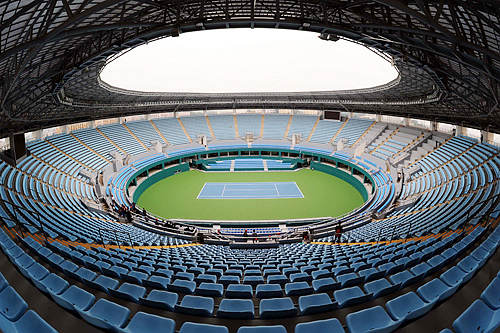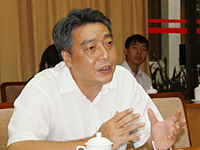|
 |
|
READY TO GO: The Guangdong Olympic Tennis Center is one of the 12 new venues constructed for the 16th Asian Games. Interior decoration and equipment installment were recently completed in all venues and facilities for run-through operations (LIU DAWEI) |
The pieces of the upcoming 16th Asian Games, to be held on November 12-27, are falling into place as the host city Guangzhou prepares for an influx of athletes and sports spectators.
Spirits are high among local officials in Guangzhou, south China's Guangdong Province, especially Vice Mayor Xu Ruisheng, who has worked tirelessly to ensure the games are successful for the city and the country.
 |
|
Xu Ruisheng, Vice Mayor of Guangzhou and Executive Deputy Secretary General of Guangzhou Asian Games Organizing Committee |
"I always prefer to say we are moving on 'as scheduled' instead of 'we are completely ready,'" said Xu, who is also the Executive Deputy Secretary General of Guangzhou Asian Games Organizing Committee (GAGOC).
A number of obstacles can arise before the curtain is drawn for such a large event like this, Xu said, but GAGOC and the entire city is prepared for anything.
"The level of preparation and emergency plans we have in place will make all the difference," Xu said with bloodshot eyes, evidence of sleepless nights of planning.
New interior decorations and equipment were recently installed in all event venues and facilities. Teams of operators were sent to each venue for run-through operations—40 trial runs in total—and all venues are expected to be ready for the November event.
"Sure, problems will arise when policies and plans are put to the test during the trial period, but we'll make adjustments accordingly and in another month or so be fully prepared for the event," he said.
Asiad's appeal
Also called the Asiad and held every four years, the Asian Games as an intercontinental event are different from international sports events and provide sufficient opportunities for unique and diversified cultures across Asia to show their ability, said Xu.
With this in mind, GAGOC and the Olympic Council of Asia (OCA) organized the Road of Asia program, during which a GAGOC delegation visited National Olympic Councils in 37 Asian countries and regions. GAGOC will hold a series of exhibitions on Asian countries' culture and heritage before and during the event.
The 16th Asian Games will include as many as 42 sports, the most in the Asiad's history. Of the total, 14 are non-Olympic sports popular in Southeast Asian countries, which in particular will "ensure each Asian country takes an interest in participating," he said.
Match schedules won't be released until the third round of athlete application is completed on September 30. Even so, statistics from the first two rounds indicate Guangzhou will attract more athletes than any previous host city, with participation from all 45 countries and regions in Asia.
Ticket sales will peak in October after the event schedule is finalized. But Xu said making financial ends meet remains GAGOC's goal, since they cannot be as ambitious as Beijing Olympic organizers in terms of ticket sales.
"Compared with the Beijing Olympics in 2008, the Guangzhou Asian Games is less appealing to an international audience. It has no qualification rounds, and the venue for the opening and closing ceremonies can hold an audience of a little more than 20,000, only one third of the Bird's Nest (the National Stadium) capacity," he said.
| 